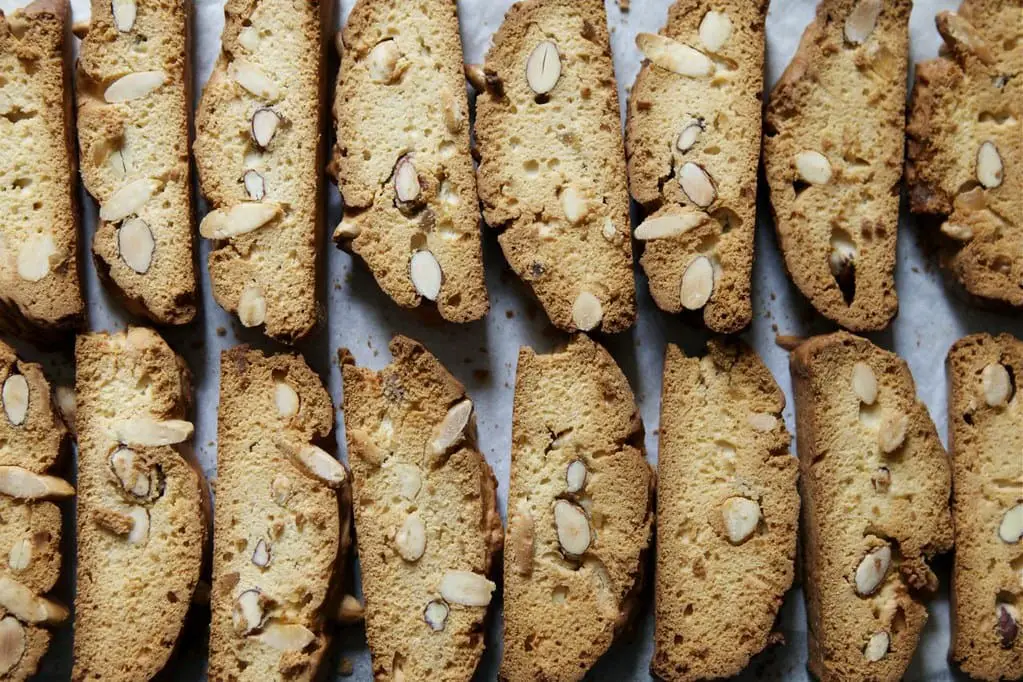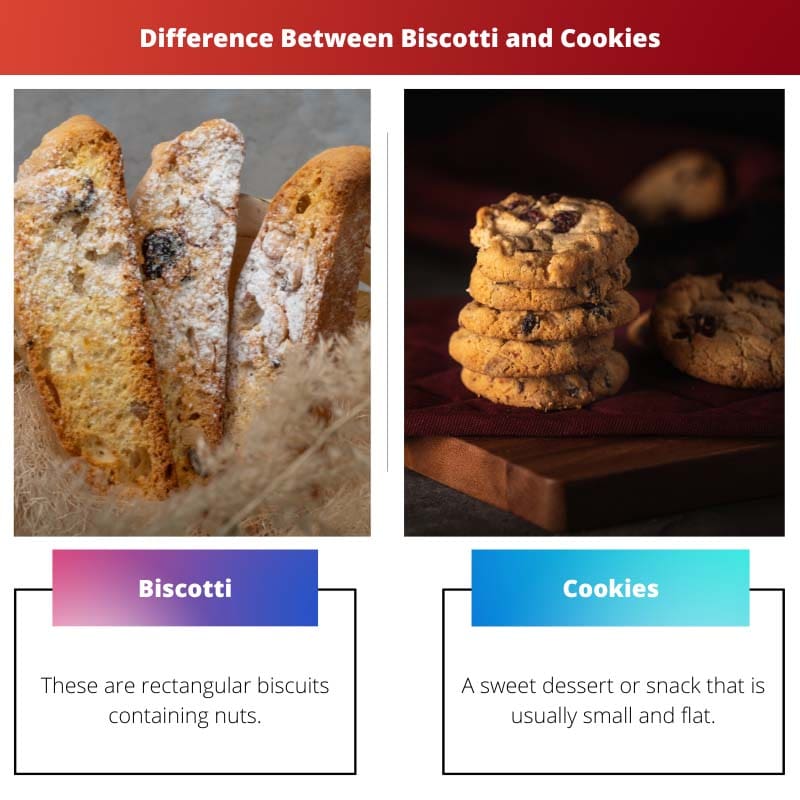Biscotti and Cookies are confectionery snacks that people love to have when they have friends over with a bottle of wine. These snacks are similar in many aspects and serve the same purpose.
These snacks have become an important part of our lives as no conversation can go on without these cookies on the counter. Though these snacks have many things in common, differences arise in their history, origin, and the purpose of baking them.
Key Takeaways
- Biscotti are Italian twice-baked cookies with a hard, crunchy texture, while cookies encompass a broader category of sweet baked treats with various textures and flavors.
- Biscotti are traditionally enjoyed with coffee or tea, as their hardness makes them perfect for dipping, whereas cookies can be eaten on their own or paired with beverages.
- Biscotti are elongated and dry, while cookies come in numerous shapes and may be soft, chewy, or crisp.
Biscotti v/s Cookies
The difference between Biscotti and Cookies is that Biscotti are Italian biscuits made with almonds or pine nuts that were originated in the city of Prato in the 15th Century. These biscuits are baked twice and are preferred to be dipped in a drink. On the other hand, cookies are also a form of biscuit, smaller than biscotti, and were originated in Persia in the 7th century.

Biscotti are the slices of cookies that are made from the dough which has been baked and divided into equal separate pieces and then renamed for obtaining texture and low moisture.
Generally, biscotti has a long and finger-like shape and because of double baking this biscuit, it dries out completely which gives it a crunchy texture.
A cookie is a type of dessert or snack made by baking or cooking in the oven and is small and flat. Cookies are made by mixing flour, sugar, butter, or oil and eggs.
These ingredients are the basics for baking a cookie but other ingredients like raisins, oats, nuts, Choco chips are also included to give it extra flavor and texture.
Comparison Table
| Parameters of Comparison | Biscotti | Cookies |
|---|---|---|
| Meaning | These are rectangular biscuits containing nuts. | A sweet dessert or snack that is small and flat. |
| Time of origin | 15th Century | 7th Century |
| Ingredients | Flour, Sugar, Eggs, Nuts. | Flour, Sugar, Fat, Eggs |
| Place of origin | Tuscany in the Prato city. | Persia |
| Texture | Hard and crunchy. | Chewy, crisp and crumbly. |
What is Biscotti?
Biscotti are a type of thick cookies or biscuits that are rectangular or oblong and were specially made to pair it with coffee, cocoa, or any dessert wine.
The term Biscotti is a Latin word that means twice baked as these cookies are baked twice to achieve extra crunchiness and dryness.
Originally, these cookies were made with almond flavors, but later on, many variations came. The term biscotti is used to refer to a wide range of crunchy cookies.
Biscotti was invented as a portable and durable food for the soldiers and travelers of the Roman Empire.
During the time of the renaissance, these cookies were traditionally made with almonds and a popular snack to dip into Vin Santo, the traditional Italian dessert wine and the practice of dipping biscotti in dessert wine remains constant even today, though many people outside the county prefer dipping biscotti in hot chocolate and coffee to gain a soft texture before eating it.
It is very easy to bake biscotti with a few basic ingredients such as flour, sugar, eggs, and sometimes fat. You can add any nuts, fruits, and spices into the mixture for adding extra flavor to these cookies.
The dough is prepared in a one-inch thick square loaf which is baked like a cookie and then cut diagonally and baked again for achieving crispiness.

What are Cookies?
Cookies are small and sweet cake-like pastry which is made up of flour, fat, sugar, and liquid and are baked in an oven. The term cookie is derived from the Dutch word koekje which means small cakes or little cakes.
Cookies were first made in the 7th century AD in Persia, which is the place where sugar was first produced.
Cookies are also known as biscuits in the British colonies. German people call cookies keks or Plàtzchen while the people of Spain refer to them as galletas. For making the perfect dough for cookies, three main stages are required to be considered.
Creaming is the first stage the sugar and fat are creamed together for entrapping air cells which creates a fluffy texture. All the other ingredients are incorporated into the mixture at this stage for improving the homogenization of the cookie dough.
The second stage is the incorporation of liquids where the necessary liquids are added to dissipate and the process of aeration continues.
The final stage is the incorporation of dry ingredients where flour is gently folded in the mixture which prevents the forming of gluten matrix which creates short bites for cookies.
Cookies are baked in all shapes and sizes with many different baking procedures and different formula proportions but the main basic ingredients remain the same.

Main Differences Between Biscotti and Cookies
- Biscotti were created back in the 15th century in the city of Prato while cookies were created long before the creation of biscotti in the 7th century in Persia.
- People found biscotti as a convenient snack, whereas cookies were considered to be pleasurable.
- Biscotti are in long rectangular shapes that are twice-baked to achieve extra crispiness, whereas cookies are small and round with variations in their texture according to the additional ingredients incorporated in the dough.
- Biscotti are traditionally paired with a wine named Vin Santo, whereas cookies are paired with several wines depending upon the flavor of the cookie.
- Biscotti is a type of cookie that was created by baking it twice as Romans believed that baking bread twice made the bread last longer that is why they baked cookies twice and biscotti were baked, whereas cookies were baked as sample cakes which bakers used to test the temperature of the oven.
